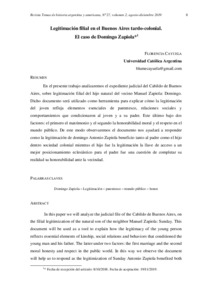Por favor, use este identificador para citar o enlazar este ítem:
https://repositorio.uca.edu.ar/handle/123456789/9783| Campo DC | Valor | Lengua/Idioma |
|---|---|---|
| dc.contributor.author | Cayuela, Florencia | es |
| dc.date.accessioned | 2020-04-22T23:45:55Z | - |
| dc.date.available | 2020-04-22T23:45:55Z | - |
| dc.date.issued | 2019 | - |
| dc.identifier.citation | Cayuela, F. Legitimación filial en el Buenos Aires tardo-colonial : el caso de Domingo Zapiola [en línea]. Temas de Historia Argentina y Americana. 2019, 27(2). Disponible en: https://repositorio.uca.edu.ar/handle/123456789/9783 | es |
| dc.identifier.issn | 2618-1924 (on line) | - |
| dc.identifier.uri | https://repositorio.uca.edu.ar/handle/123456789/9783 | - |
| dc.description.abstract | Resumen: En el presente trabajo analizaremos el expediente judicial del Cabildo de Buenos Aires, sobre legitimación filial del hijo natural del vecino Manuel Zapiola: Domingo. Dicho documento será utilizado como herramienta para explicar cómo la legitimación del joven refleja elementos esenciales de parentesco, relaciones sociales y comportamientos que condicionaron al joven y a su padre. Este último bajo dos factores: el primero el matrimonio y el segundo la honorabilidad moral y el respeto en el mundo público. De este modo observaremos el documento nos ayudará a responder como la legitimación de domingo Antonio Zapiola beneficio tanto al padre como el hijo dentro sociedad colonial mientras el hijo fue la legitimación la llave de acceso a un mejor posicionamiento eclesiástico para el padre fue una cuestión de completar su realidad su honorabilidad ante la vecindad. | es |
| dc.description.abstract | Abstract: In this paper we will analyze the judicial file of the Cabildo de Buenos Aires, on the filial legitimization of the natural son of the neighbor Manuel Zapiola: Sunday. This document will be used as a tool to explain how the legitimacy of the young person reflects essential elements of kinship, social relations and behaviors that conditioned the young man and his father. The latter under two factors: the first marriage and the second moral honesty and respect in the public world. In this way we observe the document will help us to respond as the legitimization of Sunday Antonio Zapiola benefited both the father and the son within colonial society while the son was the legitimation the key to access a better ecclesiastical position for the father was a matter of completing your reality with respect to the neighborhood. | es |
| dc.format | application/pdf | es |
| dc.language.iso | spa | es |
| dc.publisher | Pontificia Universidad Católica Argentina. Facultad de Ciencias Sociales. Departamento de Historia. Centro de Historia Argentina y Americana | es |
| dc.rights | Acceso abierto | * |
| dc.rights.uri | http://creativecommons.org/licenses/by-nc-sa/4.0/ | * |
| dc.source | Temas de Historia Argentina y Americana. 2019, 27(2) | es |
| dc.subject | HISTORIA ARGENTINA | es |
| dc.subject | VIRREINATO DEL RIO DE LA PLATA | es |
| dc.subject | FAMILIA | es |
| dc.subject | HISTORIA SOCIAL | es |
| dc.subject | PERIODO HISPANICO | es |
| dc.title | Legitimación filial en el Buenos Aires tardo-colonial : el caso de Domingo Zapiola | es |
| dc.type | Artículo | es |
| uca.disciplina | HISTORIA | es |
| uca.issnrd | 1 | es |
| uca.affiliation | Fil: Cayuela, Florencia. Pontificia Universidad Católica Argentina; Argentina | es |
| uca.version | publishedVersion | es |
| item.languageiso639-1 | es | - |
| item.fulltext | With Fulltext | - |
| item.grantfulltext | open | - |
| Aparece en las colecciones: | TEM - 2019 nro. 27 vol 2 | |
Ficheros en este ítem:
| Fichero | Descripción | Tamaño | Formato | |
|---|---|---|---|---|
| legitimacion-filial-buenos-aires.pdf | 227,66 kB | Adobe PDF |  Visualizar/Abrir | |
| Temas-de-historia-27-2.jpg | 61,06 kB | JPEG |  Visualizar/Abrir |
Visualizaciones de página(s)
298
comprobado en 04-feb-2026
Descarga(s)
243
comprobado en 04-feb-2026
Google ScholarTM
Ver en Google Scholar
Este ítem está sujeto a una Licencia Creative Commons

